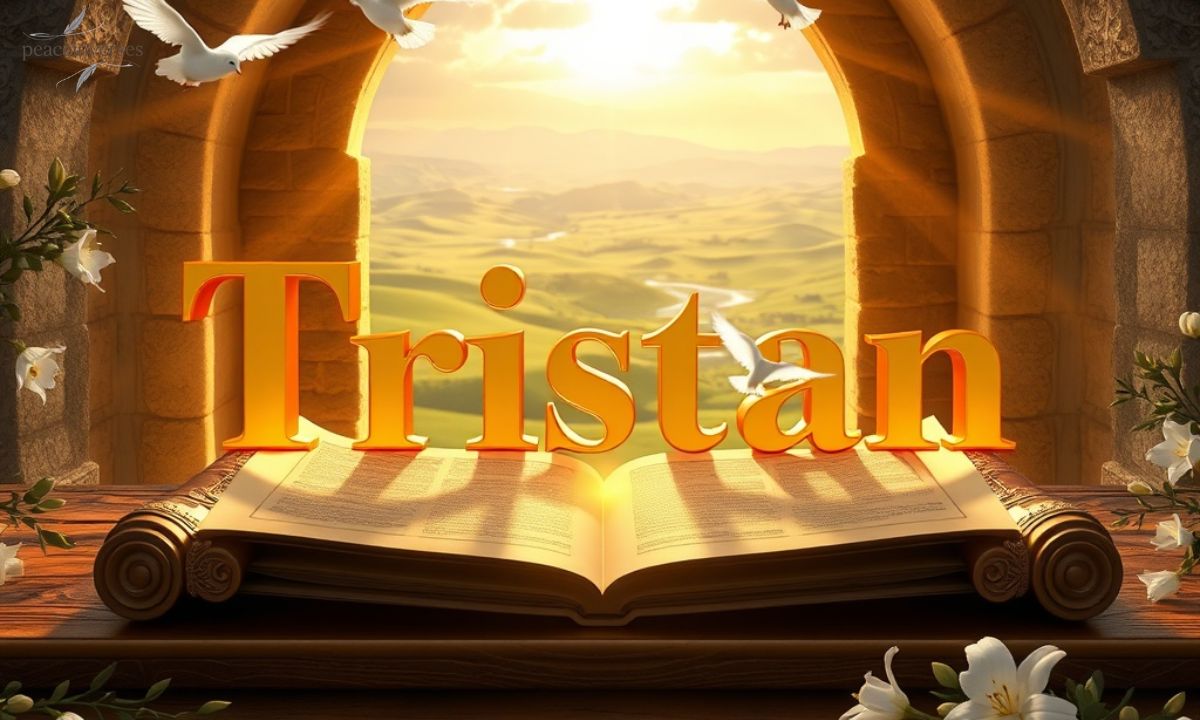Some names are just names, but others feel like they carry a deeper story. Tristan is one of those names. It carries the sound of sorrow but also the strength of courage. It speaks of both pain and the hope that follows.
You might ask, is Tristan found in the Bible? The name itself is not written in Scripture. Yet, its meaning reflects many truths found in God’s Word. It speaks of standing strong in trials, trusting God in storms, and finding joy after pain.
In this article, we will look at the Tristan meaning in the Bible context. We will explore where the name comes from and what it symbolizes. Even without appearing in Scripture, it still reminds us of God’s power to turn sorrow into purpose and pain into victory.
Is Tristan Mentioned in the Bible?
The name Tristan is not found in the Bible. There is no person in Scripture with this name. Yet, it still carries a deep spiritual meaning. It can reflect many truths found in God’s Word.
Tristan comes from the Latin word “Tristis,” meaning sorrowful or full of sadness. This meaning connects with many biblical stories. The Bible shows how sorrow can be turned into hope. God uses pain to build faith and strength.
We can see this in the life of Job, who suffered greatly yet stayed faithful. David poured out his heart in the Psalms during hard times. Paul faced many trials but kept his trust in God. Their stories show sorrow leading to strength.
For Christians, Tristan can be more than a name. It can remind us that no pain is wasted. God can turn every trial into growth. Every storm can lead to a stronger faith.
Tristan in the Bible: Biblical Significance and Spiritual Insights
Even though the name Tristan does not appear directly in the Bible, it carries rich symbolic meaning when examined through its roots, cultural background, and how it can connect with Biblical principles. Below is a table highlighting its meaning, significance, and spiritual lessons:
| Aspect | Explanation |
| Name Origin & Meaning | Tristan is often linked to the Latin word “tristis” meaning “sad” or “sorrowful.” Spiritually, it reminds us of human struggles, but also the hope for joy and redemption found in God. |
| Biblical Connection | While not a Biblical name, it connects to themes of sorrow and restoration, similar to verses like Psalm 30:5, “Weeping may endure for a night, but joy comes in the morning.” |
| Spiritual Symbolism | The name symbolizes trials, brokenness, and inner battles. In a Biblical lens, it reflects how God can transform sorrow into strength through faith. |
| Moral Lessons | Tristan teaches that even in sadness or weakness, one can find purpose. The Bible shows that God uses struggles to refine character -Romans 5:3–4. |
| Faith Application | Those with the name Tristan can be reminded to surrender sorrow to God, trusting Him to turn pain into peace and weakness into testimony. |
| Christ-Centered Insight | Just as Christ bore sorrow and suffering-Isaiah 53:3, the name Tristan can point believers to the comfort and healing found in Jesus. |
| Spiritual Encouragement | A person with this name can view it as a calling to overcome sadness with hope, to live as a witness of God’s transforming grace. |
| Prophetic Reflection | Symbolically, Tristan may represent the journey from mourning to dancing Psalm 30:11, showing how God rewrites painful stories into testimonies of victory. |
Origin and Etymology of Tristan
The name Tristan is not in the Bible. But its origin gives it deep meaning. It speaks of sorrow and inner strength. It reflects a journey of faith and courage. Tristan comes from two main roots:
Latin — Tristis (“sorrowful”)
- Tristis is a Latin adjective that means sad or sorrowful.
- The related noun tristitia means sorrow or grief.
- Many Romance languages keep this root (e.g., Spanish triste, French triste).
- As a name element, it brought a sense of weight and solemn feeling.
- In Christian thought, sorrow can point to repentance, humility, or redemptive suffering.
- Used as a personal descriptor in medieval times, it could mark someone who had experienced loss or deep feeling.
- Spiritually, the Latin root highlights inward emotion and the honest naming of pain.
- This side of the name invites reflection, compassion, and growth through hardship.
Celtic — Drustan / Trystan (boldness, tumult)
- Forms like Drustan and Trystan appear in Old Welsh and Breton records.
- These Celtic forms carry ideas of boldness, action, or tumult.
- The name is linked to medieval romance and the Tristan & Isolde cycle.
- In legends it often marks a warrior, a lover, or a tragic hero—someone who acts boldly.
- As a root, it adds movement, courage, and a public-facing strength to the name.
- The Celtic layer gives Tristan a sense of loyalty, daring, and dramatic fate.
- Scholars note meanings vary by region and time, so some uncertainty remains.
- This side of the name points to outward courage and the willingness to face conflict.
When seen through a biblical lens, Tristan is more than a name linked to sorrow—it becomes a symbol of strength in trials. It reflects courage in hard times, showing the resilience that comes from trusting God’s promises. Just as many in Scripture held fast to their faith through seasons of pain, the meaning of Tristan points to enduring hope, steadfast trust, and the belief that God can turn sorrow into purpose.
Bible Verses That Reflect Tristan’s Meaning

The name Tristan speaks of sorrow, courage, and hope. While not found in the Bible, its meaning connects deeply with God’s Word. These verses show how trials can lead to strength. They remind us that faith can turn pain into purpose.
Romans 8:18 (NIV) – Suffering to Glory
“I consider that our present sufferings are not worth comparing with the glory that will be revealed in us.”
This verse reminds us that suffering is not the end. Greater joy is promised for those who endure. It matches Tristan’s message of hope after hardship.Sorrow often teaches trust in God. It shapes character and strengthens faith. Tristan’s meaning reflects this process of growth. Many verses in the Bible speak to this truth.
James 1:12 (NIV) – Enduring Trials
“Blessed is the one who perseveres under trial because, having stood the test, that person will receive the crown of life that the Lord has promised to those who love him.”
This verse shows the blessing of endurance. It speaks of reward after testing. Tristan’s meaning carries the same spirit of perseverance.Faith can bring peace even in loss. God uses every season for His purpose. Tristan’s meaning points to this hope. The Bible gives many promises for the sorrowful.
Job 1:21 (NIV) – The Lord Gives and Takes
“The Lord gave and the Lord has taken away; may the name of the Lord be praised.”
This verse reflects worship in the middle of pain. Job’s faith stayed strong in loss. Tristan’s meaning connects with this heart of trust.Trials test and shape believers. They prepare us for greater things. Tristan’s meaning reminds us of this truth. It speaks of courage through challenges.
Matthew 17:20 (NIV) – Faith Moves Mountains
“If you have faith as small as a mustard seed… nothing will be impossible for you.”
This verse shows the power of faith, even in small measure. It speaks of victory despite weakness. Tristan’s meaning carries this hope and boldness.God’s promises give strength in sorrow. His Word turns pain into peace. Tristan’s meaning reflects these truths. Each verse is a reminder that no hardship is wasted.
Psalm 34:18 (NIV) – The Lord is Close to the Brokenhearted
“The Lord is close to the brokenhearted and saves those who are crushed in spirit.”
This verse shows God’s care for the hurting. It is comfort for those in sorrow. Tristan’s meaning fits this promise of compassion.
Summary of this section
The verses connected to Tristan’s meaning show how God works through sorrow. They remind us that pain can lead to strength. Faith grows when we trust Him in trials. Each promise brings hope for a better ending.
Spiritual Symbolism of the Name Tristan
The name Tristan holds deep meaning. It tells a story of life’s struggles and victories. Each part shows growth through faith. It reflects a journey of hope.
This symbolism shows that challenges can change us. With God’s help, sorrow can turn into joy. Pain can shape purpose. Faith can bring healing and peace.
Sorrow → Strength
Sorrow can feel heavy and endless. But in God’s hands, it can make us strong. It teaches patience and endurance. Tristan reflects this transformation.
Strength is built through hard seasons. Every trial adds to inner courage. God lifts the weary and gives hope. Tristan stands for rising above sadness.
Trials → Trust
Life’s trials can shake our hearts. But they also invite us to trust God more. Trust grows when we see His faithfulness. Tristan reflects this deep reliance.
In trials, faith becomes stronger. We learn God never leaves us alone. His promises guide us through storms. Tristan shows trust built in hardship.
Pain → Purpose
Pain is never wasted in God’s plan. It can open doors to help others. It shapes us into compassionate people. Tristan speaks of this journey.
Purpose often comes from life’s hardest moments. Lessons learned can inspire and heal. God can use our past for good. Tristan shows how pain finds meaning.
Faith → Restoration
Faith is the key to healing. It brings hope when life feels broken. God restores what is lost. Tristan reflects this renewal.
Restoration is a promise from God. He can make all things new again. Faith keeps us believing in His power. Tristan stands for fresh beginnings.
Is It a Good Christian Name?
Yes, Tristan is a good choice for a Christian name. It carries deep values of faith and hope. Even if it is not in the Bible, its meaning reflects God’s truth. It speaks of strength, trust, and restoration.
Choosing Tristan reflects:
- Perseverance – Enduring hardships with faith in God.
- Redemption – Seeing sorrow turned into joy.
- Spiritual resilience – Standing strong in trials.
As believers, we know God values the heart more than the exact name. Tristan shows a journey from pain to peace. It can inspire faith and hope in those who hear it. It is a name with a message of God’s grace.
Tristan in Legends vs Christian Truth
The well-known tale of Tristan and Isolde comes from medieval literature. It is a romantic yet heartbreaking story of deep love, betrayal, and a tragic end. The legend is filled with drama, emotional passion, and human weakness.
While it captures the imagination, its message is very different from the truth found in God’s Word. In Christian faith, the meaning of life, love, and trials is deeper, stronger, and filled with eternal hope.
In the legend:
- Love is ruled by feelings and desires, not lasting commitment.
- Sorrow leads to loss and hopelessness, not healing.
- Fate is seen as the ultimate ruler, not God’s divine plan.
But in Christian truth:
- Love is grounded in sacrifice, selflessness, and covenant promises.
- Sorrow is not the end but a door to restoration and new beginnings.
- Trials are part of God’s purposeful design, not random events.
When viewed through the lens of faith, the name Tristan transforms from a symbol of romantic tragedy into a testimony of God’s redeeming power. Instead of representing loss, it becomes a name that speaks of courage, resilience, and trust in God’s perfect will.
Pain is no longer wasted—it is shaped into purpose. Love is no longer fleeting—it is anchored in God’s unchanging truth. This is why, in a Christian context, the name Tristan can be a powerful reminder that no story is too broken for God to restore.
Conclusion
The name Tristan may not be found directly in the Bible, but its values can reflect strong Christian truths. When seen through the lens of faith, it carries themes of endurance, redemption, and hope in God’s plan. Rather than being defined by old legends, it becomes a symbol of strength and trust in divine purpose.
Choosing Tristan can be a meaningful decision for parents, writers, or anyone seeking a name that reflects courage and spiritual resilience. It reminds us that God can turn sorrow into joy, trials into growth, and every life story into a testimony of His grace.
FAQ’s
What is the meaning of Tristan in the Bible?
It is not directly in the Bible, but it can represent perseverance and hope in faith.
What is the meaning of Tristan?
Tristan is often linked to “sorrowful” or “bold,” depending on origin.
Is the name Tristan good?
Yes, it can be a positive and meaningful name when tied to Christian values.
Does Tristan mean brave?
In some interpretations, it can mean bold or courageous.
What is the Tristan meaning in Bible verse context?
It reflects enduring trials with faith, similar to biblical figures.
What is the Tristan meaning in Greek?
It is not originally Greek, so no direct meaning in that language.
What is the Tristan meaning in Hebrew?
It does not have a Hebrew origin or biblical root.
What does the name Tristan say about personality?
It may suggest someone strong, resilient, and faithful.
How is Tristan pronounced in the Bible context?
It is pronounced the same: Tris-tan.
What is the Tristan meaning in Bible Catholic interpretation?
Catholic meaning aligns with Christian values—strength through trials.
What is the Tristan meaning in Hindi?
It is not a traditional Hindi name, so meaning may differ in that culture.
Is the name Tristan in the Bible?
No, it is not directly mentioned in Scripture.

Muhammad Shoaib is a passionate faith-based writer with over 10 years of experience in creating meaningful content centered around prayers, Bible meanings, scriptural teachings, and heartfelt wishes. He is the lead writer at PeaceInVerses.com, where he shares spiritual insights and uplifting messages to guide and inspire readers on their faith journey.

